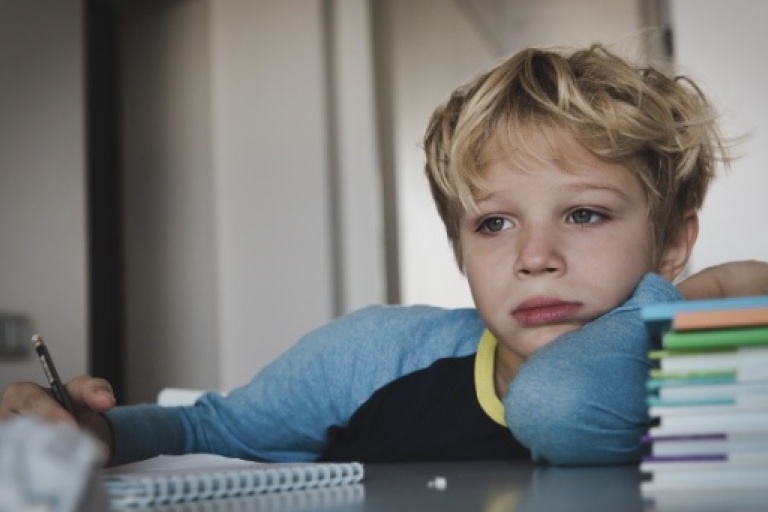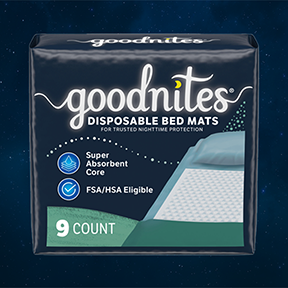Transition From Potty Training
Nighttime Potty Training
02 Nov, 2022
3.5 min. Read
If your child has finished potty training during the day, you might be wondering when they’ll start making it through the night without wetting the bed. The answer can be complicated — and that’s because daytime potty training is completely different from staying dry at night. Read on to learn why and get some nighttime potty training tips.
There are is an important distinction to be made between nighttime potty training, night training and bedwetting.
Most children should stay dry at night by 7 years old or older. If nighttime wetness is occurring after these ages, you discuss your concerns with your child's doctor.
- Nighttime potty training is helping a child who is awake get up to use the bathroom during the night. Meaning, potty training at night instead of during the day. There are things you can do to help a child learn these skills.
- Night training — or the idea of training a child who is asleep — isn’t possible. You can’t provide instructions to a child who is asleep to wake up and use the bathroom. There are bedwetting alarms that are triggered by wetness that may help speed the brain’s connection to the bladder, but there is nothing you can tell or teach your child to speed the process. If they are wetting while unconscious, they are experiencing bedwetting.
- Bedwetting is when a child who is asleep wets the bed. Bedwetting, also known as nighttime wetting or nocturnal enuresis, is very common. It affects 5-10% of children below the age of 10, and some older children and teenagers as well.
Bedwetting Is Common — And Usually Nothing to Worry About
Bedwetting is a normal part of growing up for millions of kids and occurs most often because their brain and bladder aren’t yet communicating well. Kidneys make urine and pass it down tubes into the bladder. The bladder holds the urine. And a sphincter muscle holds the urine in the bladder. When the bladder is full, it sends a message to the brain, and the brain tells the gate to open. A cause of bedwetting with children is that their brain and bladder have not fully figured out how to work together and the bladder will just open and release urine whenever it feels full. This is most likely due to an underdeveloped bladder. As a child becomes older, their brain and bladder communicate better, and the child can control their bladder and urinate when they are ready. The important distinction is that bedwetting is not something that can be trained out of a child while nighttime potty training is a series of activities that parents can do to help a child who is awake at night use the toilet.When to Night Time Potty Train
Most children begin to show signs that they are ready to potty train between 18 and 24 months old. The average age is 27 months old. Boys often start later and take longer to learn to use the potty than girls. There is no evidence that the age at which a child goes through potty training raises or lowers their risk of bedwetting. Nighttime control usually comes much later than daytime control. At 30 to 36 months old, most children will have achieved daytime dryness, and at 36 to 48 months most children will have better control over their bladder at night. Most children can stay dry at night between ages 5 and 7 years old.How to Nighttime Potty Train
To help your child get through the night dry, try these tips:- Ask your child to practice holding their urine for longer and longer times during the day. This helps stretch the bladder so it can hold more urine.
- Limit drinks before bedtime. Encourage your child to drink more in the morning or at lunchtime and drink in the evening only if they are thirsty. Try to prevent them from drinking an hour or two before bed. Limit caffeinated and carbonated drinks like soda. These drinks may irritate the bladder or produce extra urine.
- Encourage your child to go to the bathroom at the beginning of the bedtime routine and then again right before going to sleep.
- Remind your child that it’s okay to use the bathroom during the night. Place nightlights leading to the bathroom so your child can easily find their way.
- Provide a potty chair near the bed at night for younger children.
- Use absorbent underwear, also called nighttime underwear or youth pants. For kids who are just learning to get through the night dry or are bedwetting diapers aren’t a great choice as they might make them feel like a baby — and they already have a success to celebrate as they’ve made it through the big step of becoming potty trained. With bedwetting, training pants like GoodNites® nighttime underwear can help them feel more secure. And they can help you avoid a lot of laundry too. According to the Urology Care Foundation, the use of absorbent underwear does not prevent or delay toileting and continence control.
- Avoid punishment when your child wets the bed. It is very important to remember that your child may not be “training”: They may be experiencing nocturnal enuresis (bedwetting), which is not your child's fault or under their control. Family members and friends should not shame or punish the child.
How Long Will Nighttime Potty Training Take?
It often takes between 3 and 6 months. If you start too soon/before your child is ready, the process tends to take longer. Although nighttime or naptime dryness may be achieved simultaneously with potty training during the day, nighttime bladder control for those experiencing nocturnal enuresis normally takes several months to years after daytime training. This is because the sleep cycle needs to mature so the child can awaken in time to urinate.Advice from the Pediatrician/Medical Provider
Whether you’re just starting to explore nighttime potty training, or your child has been dealing with bedwetting for months or years, keep these tips in mind:- Manage your expectations: know that kids mature differently.
- Give your child encouragement and support.
- Remember that accidents will happen and know that punishment is never the answer.
- Be patient.
- Being observant. Understanding if your child is wetting the bed while asleep or awake will help you to determine your best steps forward.









